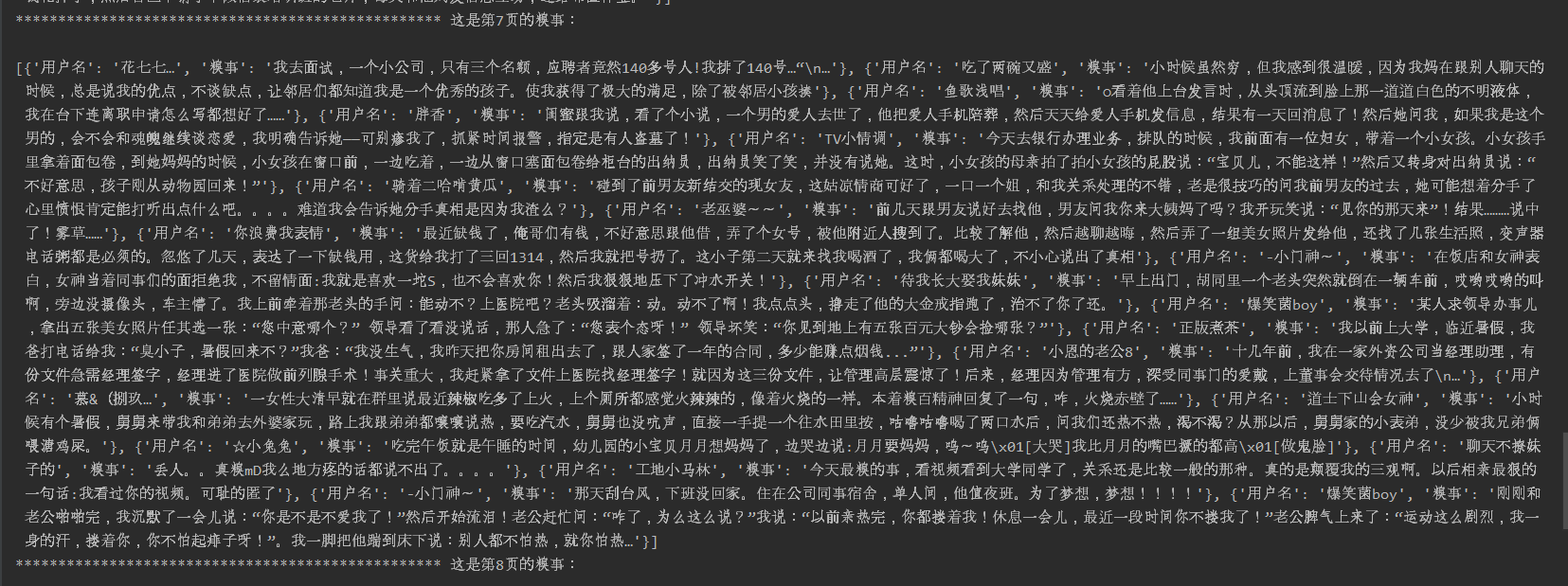糗事百科爬取
这算的上是一个练习爬,学习了这么久的正则,也懵逼了一段时间,但是一旦写起来发现正则真给力啊!
tips:
- zip() 函数 : 用于将可迭代的对象作为参数,将对象中对应的元素打包成一个个元组,然后返回由这些元组组成的列表。如果各个迭代器的元素个数不一致,则返回列表长度与最短的对象相同,利用 * 号操作符,可以将元组解压为列表。返回元组列表。
- zip 语法:zip([iterable, ...])
- 参数说明:iterabl -- 一个或多个迭代器
zip 方法在 Python 2 和 Python 3 中的不同:在 Python 3.x 中为了减少内存,zip() 返回的是一个对象。如需展示列表,需手动 list() 转换。如果需要了解 Pyhton3 的应用,可以参考 Python3 zip()。
- strip() 方法 : 用于移除字符串头尾指定的字符(默认为空格或换行符)或字符序列。
- \s : 匹配空白,即 空格,tab键
- re.S == re.DOTALL : 使 . 匹配包括换行在内的所有字符

''' @Modify Time @Author ------------ ------- 2019/9/8 23:50 laoalo ''' import re import requests head = { 'User-Agent': 'Mozilla/5.0 (Windows NT 10.0; Win64; x64) AppleWebKit/537.36 (KHTML, like Gecko) Chrome/64.0.3282.140 Safari/537.36 Edge/17.17134' } def spider(url): ''' 爬取一个页面的用户名和他的糗事 :return: 一个列表,元素是字典 ''' response = requests.get(url=url,headers=head).text # 爬取文章 articals = re.findall(r'<div\sclass="content">\s<span>(.*?)</span>', response, re.DOTALL) str_artical = [] for i in articals: temp = re.sub('<.*>', "", i).strip() str_artical.append(temp) # 爬取用户名 users = re.findall(r'<div class="author clearfix">.*?<a.*?>.*?</a>.*?<a.*?>\s<h2>(.*?)</a>', response, re.DOTALL) str_user = [] for i in users: temp = re.sub('<.*>', "", i) temp = re.sub('amp;', "", temp).strip() str_user.append(temp) # 汇总 funny=[] for i,j in zip(str_user,str_artical): temp = { "用户名":i, "糗事":j } funny.append(temp) return funny if __name__ == '__main__': for i in range(1,10): print("*"*50,"这是第{}页的糗事:\n".format(i)) url = "https://www.qiushibaike.com/hot/page/{}/".format(i) print(spider(url))



